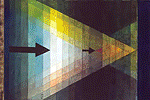 change to
the homepage of the History of Science Group at Goethe University
Frankfurt am Main
change to
the homepage of the History of Science Group at Goethe University
Frankfurt am MainFrom 1933 onwards, Jewish mathematicians in Germany lost their
jobs and were forced to emigrate. Those who did not escape on time
faced concentration camps and death. Some of those who managed to flee
the country or survive the camps were able to establish new careers in
their host countries. However, others suffered greatly from losses
caused by their forced exile and never managed to rebuild their lives.
The exhibition aims to showcase the impressive technical and
professional scope of the contribution made by Jewish mathematicians to
the development of mathematical culture in the German states before
1933. Therefore, the exhibition focuses on the time between the legal
and political emancipation of Jews in the 19th century and the rise of
the Nazis, a time in which Jewish mathematicians in German-speaking
countries achieved their most prominent successes.
For decades before their expulsion and extermination Jewish mathematicians were an important part of the German-speaking mathematical world. “Advancement through education”, which characterized German-Jewish life in the 19th and early 20th century, was especially successful in the field of mathematics. Of the 94 full professorships in mathematics at German institutes of higher education at the end of the Weimar Republic, as many as 28 were at least temporarily occupied by scholars who were Jewish or of Jewish descent. If we add the number of scholars who as a result of anti-Semitism or other factors were not permitted to qualify for a professorship, and of the many Jewish mathematicians at German-speaking universities outside Germany, it becomes clear that mathematical life pre-1933 was to a considerable extent a German-Jewish mathematical life. Jewish mathematicians contributed to scientific research, to the professional institutions of mathematics, and to all layers of mathematical culture, from academic to popular.
The exhibition highlights two points in particular. First,
during the period in question, there was probably no part of the
academic culture of mathematics in which Jewish mathematicians were not
actively involved. In the Wilhelmine Empire and the Weimar Republic
Jewish mathematicians worked in research, teaching, and publishing,
they were active in professional organizations like the German
Mathematical Society, and they participated in the public discourse on
mathematics. They contributed to shaping the German-speaking
mathematical culture of their time. Second, their activities
were so varied and multifaceted, that every stereotype of a
“Jewish” style in mathematics is immediately
refuted.
 change to
the homepage of the History of Science Group at Goethe University
Frankfurt am Main
change to
the homepage of the History of Science Group at Goethe University
Frankfurt am Main